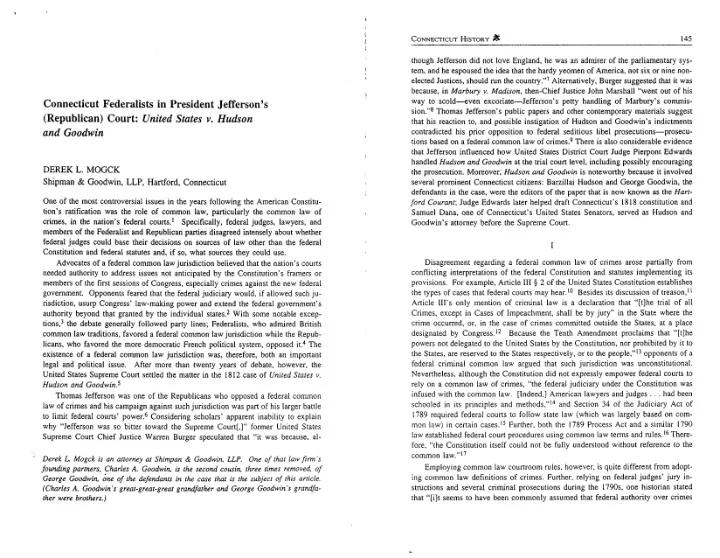

"'? 145 CONNECTICUT HISTORY though Jefferson did not love England, he was an admirer of the parliamentary sys- tem, and he espoused the idea that the hardy yeomen of America, not six or nine non- elected Justices, should run the country. "? Alternatively, Burger suggested that it was then- Chief Justice John Marshall " went out of his because, in Marbury v. Madison, way to scold-even excoriate- Jefferson s petty handling of Marbury s commis- President Jefferson Connecticut Federalists in sion. "s Thomas Jefferson s public papers and other contemporary materials suggest United States v. Hudson that his reaction to, and possible instigation of Hudson and Goodwin s indictments (Republican) Court: contradicted his prior opposition to federal seditious libel prosecutions- prosecu- and Goodwin tions based on a federal common law of crimes. 9 There is also considerable evidence that Jefferson influenced how United States District Court Judge Pierpont Edwards at the trial court level, including possibly encouraging handled Hudson and Goodwin DEREK L. MaGCK is noteworthy because it involved the prosecution. Moreover; Hudson and Goodwin Shipman & Goodwin, LLP , Hartford, Connecticut several prominent Connecticut citizens: Barzillai Hudson and George Goodwin, the Hart- defendants in the case, were the editors of the paper that is now known as the One of the most controversial issues in the years following the American Constitu- Judge Edwards later helped draft Connecticut's 1818 constitution and ford Courant; tion s ratification was the role of common law , particularly the common law of Samuel Dana, one of Connecticut s United States Senators, served as Hudson and Specifically, federal judges, lawyers, and Goodwin s attorney before the Supreme Court. crimes, in the nation s federal courts. members of the Federalist and Republican parties disagreed intensely about whether federal judges could base their decisions on sources of law other than the federal Constitution and federal statutes and, if so~ what sources they could use. Disagreement regarding a federal common law of crimes arose partially from Advocates of a federal common law jurisdiction believed that the nation s courts needed authority to address issues not anticipated by the Constitution s framers or conflicting interpretations of the federal Constitution and statutes implementing its provisions. For example, Article III 9 2 of the United States Constitution establishes members of the first sessions of Congress, especially crimes against the new federal the types of cases that federal courts may hear. tO Besides its discussion of treason, government. Opponents feared that the federal judiciary would , if allowed such ju- Article Ill' s only mention of criminal law is a declaration that " (t)he trial of all risdiction, usurp Congress ' law-making power and extend the federal government's authority beyond that granted by the individual states. 2 With some notable excep- Crimes, except in Cases of Impeachment, shall be by jury " in the State where the tions, 3 the debate generally followed party lines; Federalists, who admired British crime occurred , or, in the case of crimes committed outside the States, at a place designated by Congress. 12 Because the Tenth Amendment proclaims that " (t)he common law traditions, favored a federal common law jurisdiction while the Repub- licans, who favored the more democratic French political system, opposed it. 4 The powers not delegated to the United States by the Constitution, nor prohibited by it to the States, are reserved to the States respectively, or to the people, "! 3 opponents of a existence of a federal common law jurisdiction was, therefore, both an important legal and political issue. After more than twenty years of debate , however , the federal criminal common law argued that such jurisdiction was unconstitutional. Nevertheless, although the Constitution did not expressly empower federal courts to United States v. United States Supreme Court settled the matter in the 1812 case of rely on a common law of crimes, " the federal judiciary under the Constitution was Hudson and Goodwin. infused with the common law. (Indeed. ) American lawyers and judges. . . had been Thomas Jefferson was one of the Republicans who opposed a federal common schooled in its principles and methods, "14 and Section 34 of the Judiciary Act of law of crimes and his campaign against such jurisdiction was part of his larger battle to limit federal courts ' power. 6 Considering scholars ' apparent inability to explain 1789 required federal courts to follow state law (which was largely based on com- mon law) in certain cases. IS Further, both the 1789 Process Act and a similar 1790 why " Jefferson was so bitter toward the Supreme Court(.)" former United States law established federal court procedures using common law terms and rules. 16 There- Supreme Court Chief Justice Warren Burger speculated that " it was because, al- fore, " the Constitution itself could not be fully understood without reference to the common law, Goodwin, LLP. One of that Law finn Derek L Mogck is an attorney at Shimpan Employing common law courtroom rules, however , is quite different from adopt- is the second cousin, three times removed , of A. Goodwin, founding partners. CharLes ing common law definitions of crimes, Further. relying on federal judges ' jury in- is the subject of this article. George Goodwin. ~ne of the defendants in the case that structions and several criminal prosecutions during the 1790s, one historian stated A. Goodwin s great- great- great grandfather and George Goodwin s grandfa- (Charles that " (i)t seems to have been commonly assumed that federal authority over crimes ther were brothers.
Recommend
More recommend